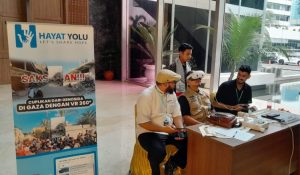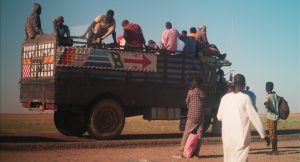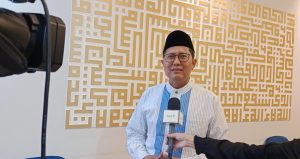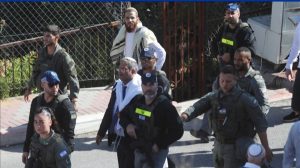 Washington, 22 Sha’ban 1434/1 July 2013 (MINA) – As the clock ticks towards the start of the holy fasting month of Ramadan, a US advocacy group has called on Muslim communities nationwide to enhance interfaith relations by sharing iftars with their neighbors of all beliefs and backgrounds.
Washington, 22 Sha’ban 1434/1 July 2013 (MINA) – As the clock ticks towards the start of the holy fasting month of Ramadan, a US advocacy group has called on Muslim communities nationwide to enhance interfaith relations by sharing iftars with their neighbors of all beliefs and backgrounds.
Also Read: UN Member States Renew Calls for Reform as Organization Marks 80th Anniversary
“The Prophet Muhammad, peace be upon him, said Ramadan ‘is the month of sharing with others,'” Ibrahim Hooper, National Communications Director of the Council on American-Islamic Relations (CAIR) said. OnIslaM quoted monitored by Mi’raj News Agency (MINA) , Monday (1/7).
“All our research has shown that prejudice and stereotyping decrease when people of other faiths know more about Islam and interact with ordinary Muslims.”
Ramadan is the holiest month in Islamic calendar. In Ramadan, adult Muslims abstain from food, drink, smoking and sex between dawn and sunset. The sick and those traveling are exempt from fasting especially if it poses health risks.
Fasting is meant to teach Muslims patience, self-control and spirituality, and time during the holy month is dedicated for getting closer to Allah though prayers, reading the Noble Qur’an and good deeds.
Also Read: Trump Warns Israel Could Lose All US Support Over West Bank Annexation
Using the holy month to bring US faiths closer, the Washington-based group issued a “Sharing Ramadan Resource Guide 2013” that offers step-by-step advice on hosting an interfaith iftar.
The guide includes instructions on forming a “Sharing Ramadan” committee, a sample media advisory for an iftar and advice on reaching out to local media.
It also offers an advertisement for the event, text for a “Welcome to Our Ramadan Fast-Breaking” brochure, frequently-asked questions about Ramadan, and a sample event program and newspaper advertisement.
“Sharing Ramadan is an annual campaign started by CAIR to encourage local communities to host iftar dinner receptions and open houses for our neighbors of other traditions,” Nihad Awad said in the “Sharing Ramadan” guide.
Also Read: Trump: Israel ‘Not Going to Do Anything with West Bank’ After Annexation Vote
“Since sharing and appreciation are essential components of Ramadan, we hope local mosques, community centers and Muslim schools will take this opportunity to invite their neighbors to join them for an iftar meal.”
According to astronomical calculations, the holy fasting month of Ramadan will start on Tuesday, July 9.
Although there are no official figures, the United States is believed to be home to between 6-8 million Muslims.
A US survey had revealed that the majority of Americans know very little about Muslims and their faith.
Also Read: Mahmoud Khalil Accuses Trump Administration of Silencing Pro-Palestine Voices
A recent Gallup World Religion Survey found that 53% of Americans see Islam “not too favorable” or worse; a much higher percentage than expressed negative feelings about other major religions.
New World
Setting the basis for interfaith relations, mosque leaders have invited non-Muslims to the worship place.
“It feels like it’s a whole new world,” said 19-year-old Omar Yamak.
Also Read: Trump Confirms Gaza Ceasefire Still in Effect Despite Israeli Violations
“You have a sense of love of the community.”
Muslim leaders in Southern California said they would also plan holding blood drives, food giveaways, interfaith meetings and other activities.
Muslims were also grateful to their neighbors who raised no opposition to the mosque construction, unlike similar projects in other Californian cities, according to Ameena Mirza Qazi of the Council on American-Islamic Relations.
In the last five years, there has been “anti-mosque activity” in more than half of the US states, according to the American Civil Liberties Union.
Also Read: Massive ‘No Kings’ Protests Erupt Across 50 US States Against Trump’s Hardline Policies
At least 18 mosque projects — from Mississippi to Wisconsin — have found foes who battle to stop them from seeing light citing different pretexts, including traffic concerns and fear of terrorism.
Even more, some mosques were vandalized including a 2011 Wichita mosque arson case for which a $5,000 reward is being offered.
In multicultural New York, a proposed mosque near Ground Zero site has snowballed into a national public and political debate, with opponents arguing that the Muslim building would be an insult to the memory of the 9/11 victims.
Advocates, however, say that the mosque would send a message of tolerance in 9/11-post America.
Also Read: Mass Layoffs Hit Federal Agencies Amid Trump’s Government Shutdown
US Muslims are now estimated between six to eight million.(T/P09/P04)
Mi’raj News Agency (MINA)
Also Read: Brazilian Activist Vows Gaza Aid Flotilla Will Continue Despite Ceasefire
Also Read: 6 Mexican Members of Global Sumud Flotilla Return Home After Israeli Detention























 Mina Indonesia
Mina Indonesia Mina Arabic
Mina Arabic